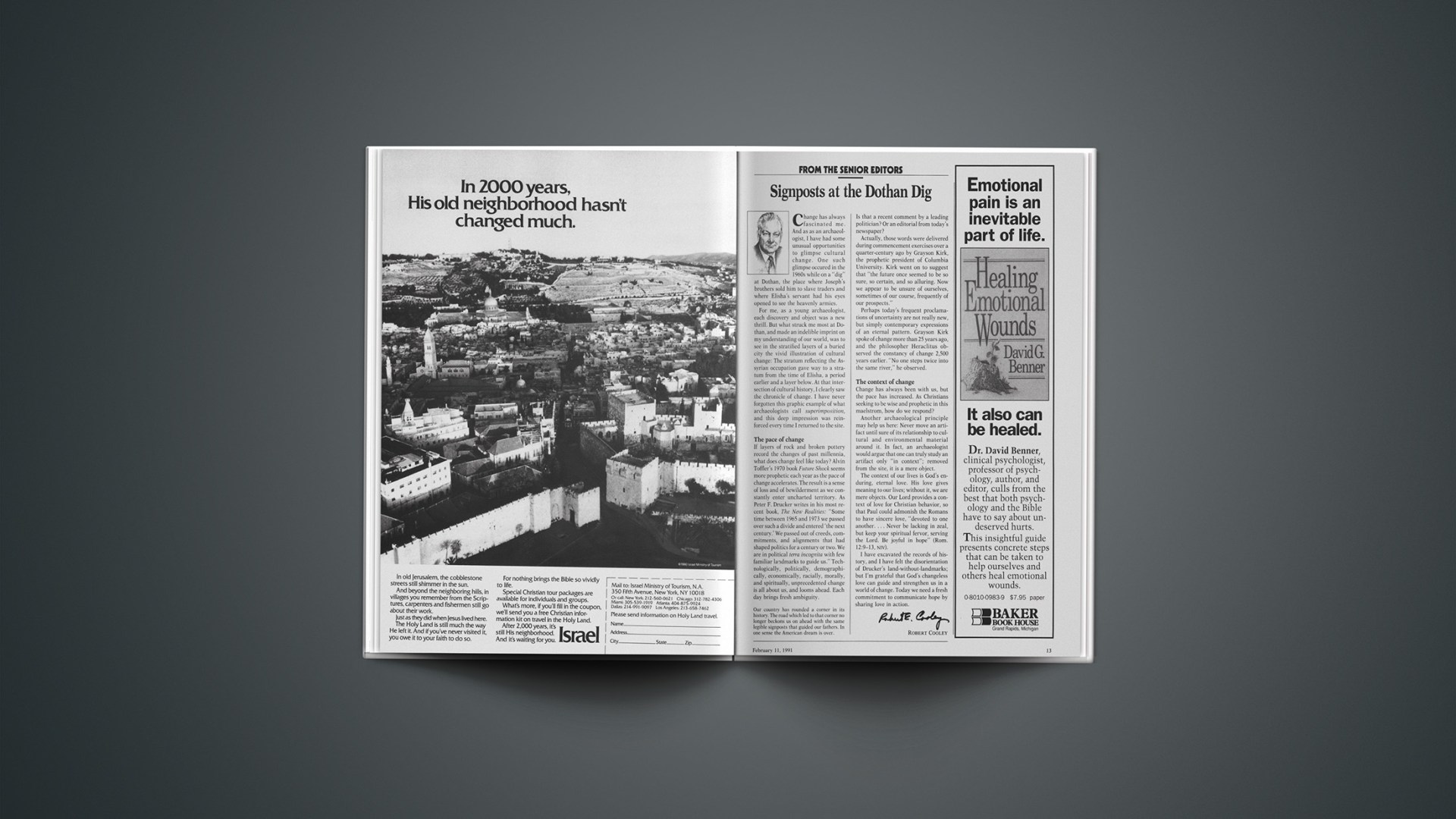Change has always fascinated me. And as as an archaeologist, I have had some unusual opportunities to glimpse cultural change. One such glimpse occured in the 1960s while on a “dig” at Dothan, the place where Joseph’s brothers sold him to slave traders and where Elisha’s servant had his eyes opened to see the heavenly armies.
For me, as a young archaeologist, each discovery and object was a new thrill. But what struck me most at Dothan, and made an indelible imprint on my understanding of our world, was to see in the stratified layers of a buried city the vivid illustration of cultural change: The stratum reflecting the Assyrian occupation gave way to a stratum from the time of Elisha, a period earlier and a layer below. At that intersection of cultural history, I clearly saw the chronicle of change. I have never forgotten this graphic example of what archaeologists call superimposition, and this deep impression was reinforced every time I returned to the site.
The Pace Of Change
If layers of rock and broken pottery record the changes of past millennia, what does change feel like today? Alvin Toffler’s 1970 book Future Shock seems more prophetic each year as the pace of change accelerates. The result is a sense of loss and of bewilderment as we constantly enter uncharted territory. As Peter F. Drucker writes in his most recent book, The New Realities: “Some time between 1965 and 1973 we passed over such a divide and entered ‘the next century.’ We passed out of creeds, commitments, and alignments that had shaped politics for a century or two. We are in political terra incognita with few familiar landmarks to guide us.” Technologically, politically, demographically, economically, racially, morally, and spiritually, unprecedented change is all about us, and looms ahead. Each day brings fresh ambiguity.
Our country has rounded a corner in its history. The road which led to that corner no longer beckons us on ahead with the same legible signposts that guided our fathers. In one sense the American dream is over. Is that a recent comment by a leading politician? Or an editorial from today’s newspaper?
Actually, those words were delivered during commencement exercises over a quarter-century ago by Grayson Kirk, the prophetic president of Columbia University. Kirk went on to suggest that “the future once seemed to be so sure, so certain, and so alluring. Now we appear to be unsure of ourselves, sometimes of our course, frequently of our prospects.”
Perhaps today’s frequent proclamations of uncertainty are not really new, but simply contemporary expressions of an eternal pattern. Grayson Kirk spoke of change more than 25 years ago, and the philosopher Heraclitus observed the constancy of change 2,500 years earlier. “No one steps twice into the same river,” he observed.
The Context Of Change
Change has always been with us, but the pace has increased. As Christians seeking to be wise and prophetic in this maelstrom, how do we respond?
Another archaeological principle may help us here: Never move an artifact until sure of its relationship to cultural and environmental material around it. In fact, an archaeologist would argue that one can truly study an artifact only “in context”; removed from the site, it is a mere object.
The context of our lives is God’s enduring, eternal love. His love gives meaning to our lives; without it, we are mere objects. Our Lord provides a context of love for Christian behavior, so that Paul could admonish the Romans to have sincere love, “devoted to one another.… Never be lacking in zeal, but keep your spiritual fervor, serving the Lord. Be joyful in hope” (Rom. 12:9–13, NIV).
I have excavated the records of history, and I have felt the disorientation of Drucker’s land-without-landmarks; but I’m grateful that God’s changeless love can guide and strengthen us in a world of change. Today we need a fresh commitment to communicate hope by sharing love in action.










